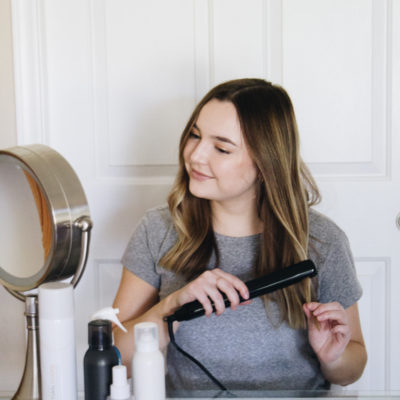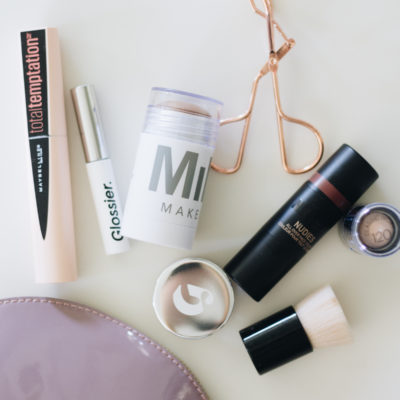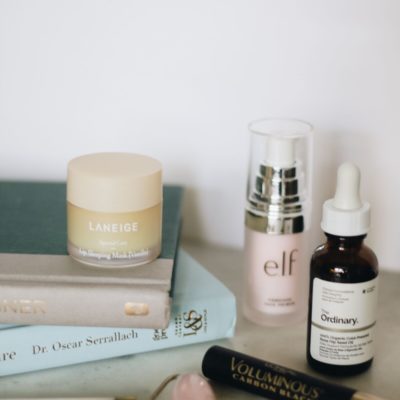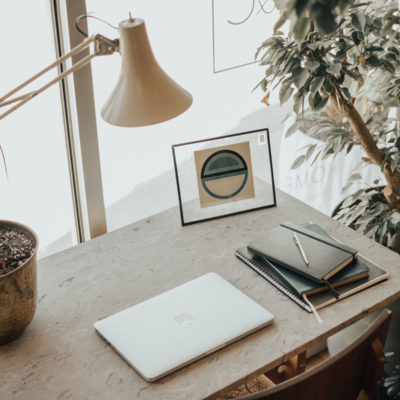Why Taking Care of Your Gut Is So Important & How to Do It
posted on October 17, 2017 | by Katina Mountanos

Gut health is having a wellness hay day. Until a few months ago, you may have only heard about the importance of probiotics in an Activia commercial, but nowadays, scientists, nutritionists and wellness advocates alike are touting the importance of gut health. Mainly because of it’s relation to a variety of other health issues.
Our gut is home to trillions of healthy (and not-so-healthy) bacteria that helps keep our bodies regulated. We’re actually made up of 5-10 times more bacteria than we are human cells! But, when that bacteria gets out of whack, it could lead to digestive, emotional and autoimmune problems. Who would have thought that anxiety and brain fog could start in your gut?!
In this article, I am going to take you through the importance of gut health, how to know if you’re experiencing gut issues masked as other problems, and what the heck you can do about it.
It all starts in the gut
About 80% of our immune system lives in our gut. In fact, our microbes (*fancy* word for gut bacteria) are the first thing that food, viruses and other bodily invaders see when they travel through our bodies. So, gut health is extremely important to our health barometer.
Of course we know that our immune system is important – no one wants to get the flu from your desk mate. But even more interestingly: our guts actually regulate our feelings and moods. For example, over 95% of our happy hormones (aka Serotonin) are housed in the gut!
Think of the gut as a creator of the most important molecules in your body. Gut bacteria does everything from regulate our metabolism (cue that 4pm snack break), to help us concentrate during that early morning meeting. So, the larger variety of gut bacteria you have, the better.
What happens if the gut goes wrong
You can think of the gut as a transportation system from the mouth, all the way to your butt – which is different than the tiny area we think of below the belly button. For a variety of reasons, ranging from the cleaning products we use to the makeup we wear, that internal tube could get inflamed.
Which is where our gut issues begin.
When our gut is working, it prevents food and other harmful bacteria from entering the bloodstream, while letting the good guys inside. But, over time that long-term inflammation creates tiny holes along the gut track – allowing the bad guys to get out. Hence the term, “leaky gut.”
When you’re experiencing a “leaky gut,” it can affect all other parts of your body and mind. Besides typical bloating and inflammation, gut problems can lead to digestive issues like Irritable Bowel Syndrome, mental issues like anxiety and depression, and even longer-term diseases like Alzheimer’s.
What the heck you can do about it
The good part about all of this is that fixing your gut can sometimes just take a reset. Gut inflammation comes from environmental and physical choices that we make, so having a healthy gut is in our control.
As I mentioned earlier, gut issues are created through long-term build up from a variety of factors. These include: stress; eating processed foods & loads of sugar; using antibiotics, toxic beauty and cleaning products, and plastics/metals, and being too clean! Our guts are made from bacteria, so all of these ingredients weaken or remove our healthy microbes.
If you want to be more conscious of your gut health, decrease your intake of sugar and processed foods. Also, start eating more fibrous, fermented foods (like kimchi). Or if those types of flavors aren’t your jam, you can turn to easier-to-stomach foods like asparagus and cauliflower – two veggies with strong prebiotic qualities.
But, sometimes you need a full-stop detox. I used this awesome program through mindbodygreen called the 7-Day Gut Reset. It helped me kickstart my gut health with a regimented week-long program, because sometimes you need an expert laying out the exact menu you should follow. Trust me – the combination of science-backed methods + a strict food plan helped get me back on track.
Do you have experience with gut issues? What tools have you used to get your gut back on track?
 Using Trunk Club to Update My Spring/Summer Wardrobe
Using Trunk Club to Update My Spring/Summer Wardrobe 5 Tips For Styling a Simple Summer Dress
5 Tips For Styling a Simple Summer Dress 5 Ways to Style a Bandana
5 Ways to Style a Bandana 3 Different Ways to Curl Your Hair
3 Different Ways to Curl Your Hair How to Master the 5-Minute Makeup Routine
How to Master the 5-Minute Makeup Routine Amazon Beauty Buys Under $25
Amazon Beauty Buys Under $25 3 Ways to Make Your next Trip More Memorable
3 Ways to Make Your next Trip More Memorable Tips for Digital Spring Cleaning and Organizing
Tips for Digital Spring Cleaning and Organizing Color Trend: Marigold
Color Trend: Marigold Mental Health Update: The 3 Major Changes I Made to Get Out of Depression
Mental Health Update: The 3 Major Changes I Made to Get Out of Depression 5 Unexpected Ways to Unwind After Work
5 Unexpected Ways to Unwind After Work How to Know You’re in a Controlling Relationship
How to Know You’re in a Controlling Relationship 4 Questions I get Asked as a Professional Resume Writer
4 Questions I get Asked as a Professional Resume Writer How to Make Friends at Work
How to Make Friends at Work Getting Out of the ‘Busy’ Mindset
Getting Out of the ‘Busy’ Mindset Ask Amanda: How do I pursue the career I want without formal training?
Ask Amanda: How do I pursue the career I want without formal training? Ask Amanda: How Do I Find a Therapist?
Ask Amanda: How Do I Find a Therapist? Ask Amanda: How do I stop being jealous in my relationship?
Ask Amanda: How do I stop being jealous in my relationship?



Krystal // The Krystal Diaries Says
I’ve had gut/stomach issues for years now! Over the past few months I started drinking a glass of Kombucha, adding MCT oil into my coffee or smoothies, and I take a probiotic as part of my daily vitamin regimen and my gut feels better than it has in years. I slowly started phasing everything in and I think the daily Kombucha is what really helped.
Janet Fazio Says
I did a 30 Days to Healthy Living challenge a few years back and realized that my “normal” wasn’t really normal at all. I felt a ton better. I still do a pre/probiotic blend every day. I think it makes a world of difference.
Mia Says
Gut health is sooooo important! I’ve dealt with gut issues, and I think a lot of people have gut problems without even realizing it. I always try to incorporate gut-healthy foods like sauerkraut into my diet.
Mia | http://www.verymuchmia.com
FAB Says
The state of your gut is very important and I learnt it the hard way! I suffered from having numerous UIT’s and drinking antibiotics caused to disrupt my natural gut bacteria. Stress was a major culprit as well. I tried numerous tricks and products and only after struggling for 2 years I was free, happy and healthy. I started drinking a herbal extract, Echinaforce (which help with colds, influenza type infections, and upper respiratory tract conditions) in my water and it worked miracles after using it only a few weeks. I also incorporated more local produced veggies into my diet and exercised more regularly. Being too clean can also be a problem and I switched to soaps containing natural products and started having baths with Epsom salts (Magnesium sulfate). The bottom line is, don’t mess with your gut, or it will mess with you. Love your blog!
Sandra Says
Love the info you’ve shared, I for one believe this is extremely true and important, thanks for sharing!
Pingback: 7 Ways to Naturally Boost Your Immunity This Winter – Advice from a Twenty Something
Emma Says
The intestines are the most important part of our body, it is important to take care of it now, before anything starts to bother you. After all, in the early stages of the development of the disease, you can still help yourself; here https://www.aloeride.com/news-on-how-to-help-diverticulitis-yourself/ you can find more information about this. In more severe and advanced cases, accompanied by acute abdominal pain and elevated body temperature, urgent hospitalization is necessary. In the department, the patient is prescribed conservative therapy. If the patient’s condition does not improve or worsens, the issue of surgical treatment of diverticulitis is decided – resection of the inflamed section of the intestine.